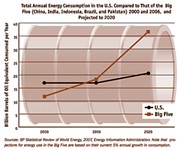Moneybags Moffett
Another Fine Pay Day for Jim Bob
By Robert Bryce, Fri., April 25, 1997
|
|
The CEO of New Orleans-based Freeport-McMoRan Copper & Gold (FMCG), last year Moffett had a compensation package that consisted of $6.956 million in salary and bonuses and another $26.776 million in long-term compensation, for a total of $33.732 million. And while that was enough to get Moffett a spot in the top 10, it's only part of his total pay package. But I'll come back to that.
According to BW's figures, Moffett's pay was a 282% increase from his 1995 pay package. How does that compare with Freeport's stock performance? According to stock tables, FMCG's stock was trading at about $33 per share at the end of April 1996. Right now, it's trading at about $30, a decline in shareholder value of about 10%.
Business Week figured that the average salary among CEOs of the 500 most valuable companies in the U.S. was $5,781,300 in 1996. So Moffett's pay was 5.9 times higher than that of the average CEO. How did Moffett compare with other CEOs in the metals and mining business? ALCOA had revenues of $13.06 billion in 1996, seven times as much as FMCG's $1.9 billion. And according to BW, ALCOA's return to shareholders between 1994 and 1996 far exceeded the return given investors by FMCG. Yet, P.H. O'Neill, the chairman and CEO of ALCOA, was paid a relatively modest $7.674 million ($1.6 million in salary and bonuses and $6.1 in longterm compensation) in 1996, less than one-fourth of what Moffett was paid. At Phelps Dodge, another company that's bigger than FMCG ('96 revenues of $3.7 billion), and that also gave shareholders a higher rate of return than FMCG, CEO D.C. Yearley was paid $2.9 million ($1.4 million in salary and bonuses and $1.5 in longterm compensation). According to BW's figures, Yearley's compensation increased by 6% when compared to 1995.
And while Moffett's $33 million payday appears out of whack when compared to similarly situated, publicly traded metals companies, it still does not reflect all of his compensation. According to the proxy statement of Freeport-McMoRan Resource Partners (FMRP), Moffett was also paid handsomely by Freeport-McMoRan Inc., the company which fathered FMCG and FMRP, as well as FM Properties, developer of the Barton Creek PUD and Circle C Ranch here in Travis County. Freeport-McMoRan, which produces fertilizer, sulphur, and other products, paid Moffett a salary of $180,556 and gave him a bonus of $1.025 million, plus miscellaneous and long-term pay totalling $693,948 and stock options with an estimated current value of $5.375 million.
Thus, Moffett's total compensation as a corporate chieftain last year was $41.007 million. At that income level, Moffett would have placed eighth on the BW list, passing Stephen Hilbert of Conseco and Casey Cowell of U.S. Robotics.
This is not the first time that Moffett has appeared on the list of America's most highly paid executives. In 1995, his pay package totaled more than $42 million. In 1992, Graef Crystal, the corporate compensation expert, named Moffett the fifth most overpaid executive in America. Crystal figured that in 1990, Moffett made $8.8 million, and that based on performance, Moffett's pay should have been about $1.28 million.
Now for a few comparisons: BW figures the average factory worker in America makes $27,661 per year. Moffett's $41 million payday was 1,482 times higher than that. Put another way, Moffett's pay was nearly three times the total amount that FMCG has agreed to pay several thousand Amungme tribal members who have been displaced by the company's mining project in Indonesia.
Figured another way, if you estimate that Moffett works 50 hours a week and takes two weeks off for vacation, he earns an hourly wage of $16,403, or $273 per minute. At that rate, Moffett makes $4.56 per second.
If you believe Moffett never stops working, and is thus paid round the clock, he earned about $1.30 per second in 1996. The federal minimum wage is $4.75 per hour.
Freeport Fights Culberson County Taxation
While Moffett is making huge amounts of money, several entities in Culberson County, in West Texas, are struggling to stay afloat in the wake of a lawsuit filed by Freeport-McMoRan against the Culberson County Appraisal District. Freeport operates a sulphur mine and processing facility in northern Culberson County and is the county's largest taxpayer.
Sally Carrasco, the county's chief appraiser, who was also named as a defendant in the lawsuit, told the Chronicle that the appraisal district county valued Freeport's operation at $51.3 million. The company is disputing $37.645 million of that valuation and has agreed to pay taxes on only $13.687 million worth of property that they are not disputing. The Appraisal District assesses tax valuations for three entities: the county government, the local school district, and the local hospital. Carrasco says the result of the dispute has been a drastic shortfall of funding for the county's essential services. She said Freeport paid the county government $95,126, instead of the $356,766 they were billed. The company paid the Culberson County-Allamoore Independent School District just $167,998 of the $462,073 it was billed, and the Culberson Hospital just $62,507 of the $234,430 it was billed.
"You can see why it's hurt our county," said Carrasco, who explained that Freeport is not only suing over their 1996 valuations, but also over the 1995 valuations. After Freeport protested the valuations last summer, Carrasco said the appraisal of their property went before the county's appraisal review board, which determined that the $51.3 million valuation was fair. "We would just like for them to do their part, you know," said Carrasco. "We feel like the value is what it should be."
Closer to home, Freeport's tax dispute with the Travis Central Appraisal District (TCAD) continues. Freeport's local subsidiary, FM Properties, sued TCAD in 1993 over appraisals of its development property on Barton Creek, claiming that TCAD overvalued some $18 million worth of the company's property. TCAD officials say that FM Properties won its lawsuit at the district court level, but TCAD has appealed the decision. No word yet on when a decision will be made on the appeal.
Beanal Lawsuit
Freeport's legal battles are continuing in federal court in the wake of U.S. District Court Judge Stanwood Duval's decision that Tom Beanal, a leader of the Amungme tribe in west Papua New Guinea, has the right to bring a lawsuit against Freeport in American courts. On April 9, Duval dismissed Beanal's lawsuit without prejudice. But Duval's ruling allows Beanal's lawyer, Martin Regan, to refile his lawsuit, and the judge's 49-page ruling provides Regan something of a blueprint upon which to base his new lawsuit.
Beanal's original lawsuit was filed a year ago in New Orleans, claiming that Freeport was responsible for environmental damage, "cultural genocide," and human rights violations in and around the company's mine, which contains, according to the latest annual report, "in excess of 55 million ounces of gold and 43 billion pounds of copper." While Duval dismissed Beanal's environmental claims, he ruled that Beanal may bring evidence before the court to show that Freeport was responsible for human rights abuses.
Citing the atrocities that occurred in Bosnia, and a case known as Kadic v. Karadzic, in which Croat and Muslim citizens filed a lawsuit against Serbian leader Radovan Karadzic, Duval said international claims involving human rights abuses do not depend solely on whether or not the actor is a state. "Certain conduct violates the law of nations whether committed by a state or private actor, whereas other conduct only violates the law of nations if committed by a state actor," wrote Duval. "Genocide, for example, violates international law, whether undertaken by a state or non-state actor."
Immediately after Duval's ruling, Freeport issued a press release claiming that the decision "confirms that the lawsuit [had] no basis in law," (see Freeport's webpage, http://www.fcx.com). But while the company is claiming victory, the ruling is not a win. While litigation over environmental damage could have hurt Freeport's reputation, Beanal's human rights claims are far more inflammatory and potentially embarrassing to the company. In his conclusion, Duval said that Beanal is "granted leave to amend his complaint in order to more specifically allege his claims for genocide and human rights violation."
UT professor Robert Boyer, a card-carrying member of the Freeport Seven, the group of journalists and activists threatened with a libel lawsuit by Freeport, has put Duval's decision on his webpage, at http://www.cs.utexas.edu/users/boyer/fp/duval-970409.html .
Freeport spokesman Garland Robinette did not return phone calls from the Chronicle. Bill Collier, a local spokesman for the company, also did not return messages.
Got something to say on the subject? Send a letter to the editor.









